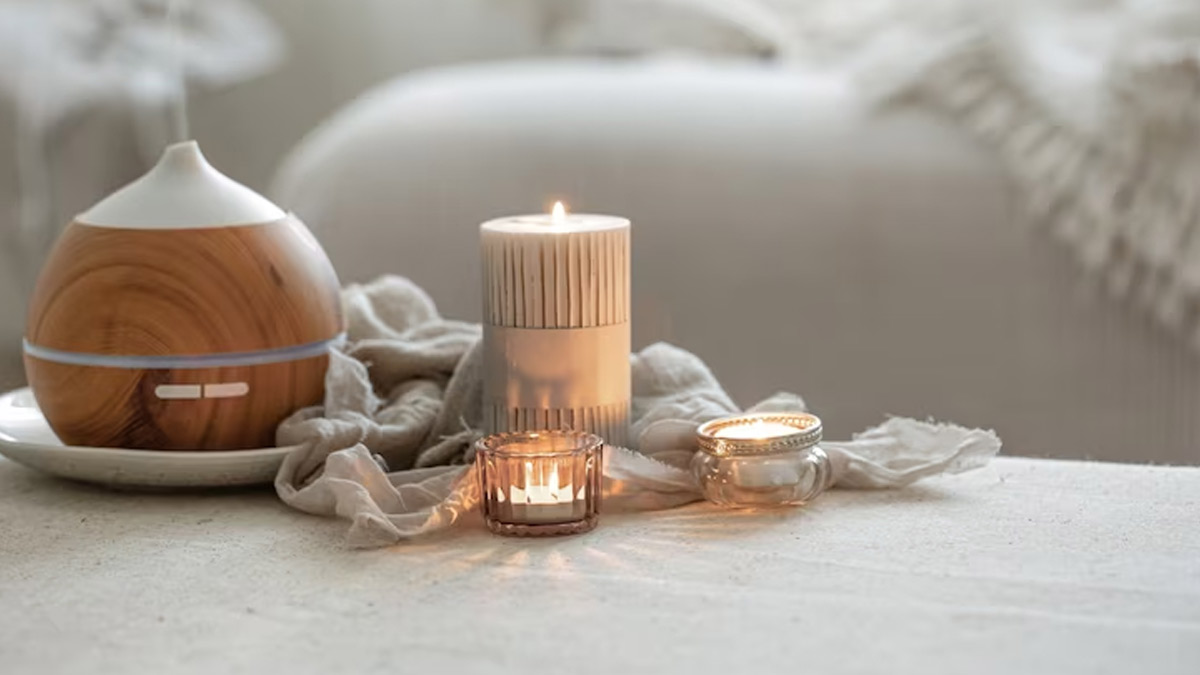
Scented candles have become a staple for many people seeking relaxation and ambiance, particularly before bedtime. The gentle flicker and soothing aroma seem like the perfect recipe for winding down after a long day. However, beneath their fragrant allure, scented candles harbour potential health hazards that may disrupt your sleep and overall well-being.
Table of Content:-
Health Hazards of Scented Candles Before Bedtime
Here are five lesser-known risks associated with lighting scented candles before bedtime.
1. Indoor Air Pollution
While scented candles may fill your room with delightful fragrances, they also release a myriad of chemicals into the air. Most conventional candles are made from paraffin wax, a byproduct of petroleum refining, which emits harmful substances like benzene and toluene when burned. These pollutants can contribute to indoor air pollution, leading to respiratory issues such as asthma, allergies, and irritation of the eyes, nose, and throat. Prolonged exposure to such pollutants, especially during sleep, can exacerbate existing respiratory conditions and compromise overall respiratory health.
2. Allergic Reactions
The synthetic fragrances and dyes used in scented candles can trigger allergic reactions in sensitive individuals. Ingredients like artificial fragrances and dyes may contain allergens and irritants that can cause skin rashes, headaches, and respiratory discomfort. For people with pre-existing allergies or sensitivities, exposure to these compounds before bedtime can disrupt sleep patterns and exacerbate symptoms, leading to a less restful night's sleep.

Also Read: Oestrogen Detoxification: Expert Shares A Comprehensive Guide to Hormone Balance and Wellness
3. Disruption of Circadian Rhythms
The soft glow of candlelight may seem calming, but it can interfere with your body's natural sleep-wake cycle. Exposure to artificial light, even from candles, can suppress the production of melatonin, the hormone responsible for regulating sleep. This disruption to your circadian rhythms can lead to difficulty falling asleep, fragmented sleep, and decreased overall sleep quality. Over time, inadequate sleep can have far-reaching consequences on your physical and mental health, including increased risk of chronic conditions such as obesity, diabetes, and cardiovascular disease.

4. Fire Hazard
While the allure of scented candles may be tempting, it's essential to remember that they pose a fire hazard, particularly when used unsupervised or near flammable materials. Accidental fires caused by unattended candles can result in property damage, injury, or even loss of life. To mitigate this risk, always extinguish candles before bedtime or use safer alternatives such as flameless LED candles to create a similar ambiance without the fire hazard.
Also Read: Nutrition Powerhouse: 8 Health Benefits of Brown Turkey Figs
5. Toxicity of Fragrance Ingredients
The fragrance oils used in scented candles often contain a cocktail of synthetic chemicals that may pose long-term health risks. Phthalates, for example, are commonly used as fragrance fixatives and have been linked to hormone disruption, reproductive issues, and adverse effects on foetal development. Furthermore, many fragrance ingredients are proprietary blends protected by trade secrets, making it challenging for consumers to assess their safety. Opting for natural candles made from soy or beeswax and scented with essential oils can help minimise exposure to potentially harmful chemicals.
Bottomline
While scented candles may seem like harmless indulgences, their use before bedtime can have unintended consequences on your health and well-being. From indoor air pollution and allergic reactions to disruption of circadian rhythms and fire hazards, the risks associated with scented candles are manifold. To promote a restful night's sleep and safeguard your health, consider alternatives such as aromatherapy diffusers with essential oils or opting for natural candles made from safer materials. By being mindful of the hidden health hazards of scented candles, you can create a sleep environment that nurtures both your body and mind.
Also watch this video
Read Next
National Colorectal Cancer Awareness Month 2024: Know About The Warning Signs Of Colorectal Cancer
How we keep this article up to date:
We work with experts and keep a close eye on the latest in health and wellness. Whenever there is a new research or helpful information, we update our articles with accurate and useful advice.
Current Version
